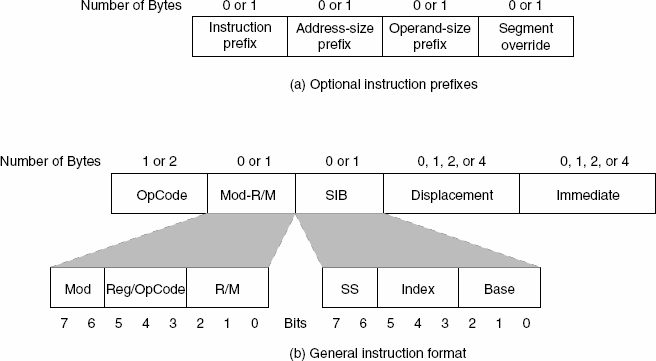Hola, amigos. Estoy desarrollando un pequeño desensamblador en ensamblador (suena algo redundante, pero no lo es). Tengo una duda. Antes que nada, quiero decir que ya estoy leyendo los manuales de Intel y revisando páginas en internet. (Para que no digan que no investigo).
El problema es el siguiente: Digamos tengo una instruccion X. ¿Como hago para saber si el primer byte que tengo en frente es un opcode en puro, un prefijo, o un opcode extendido?. Antes yo había tratado comparando el byte inicial con los valores asignados por Intel a los prefijos x86, pero ¿que pasa si la instruccion, de casualidad posee el mismo valor en hexadecimal que el prefijo?.
Ah, ¿Será que alguien me puede aclarar si los prefijos cumplen el siguiente orden?

¿Y como hago para reconocer si debería ser un prefijo? Por que según Intel, los prefijos pueden ir en cualquier orden dentro de los 4 primeros bytes (me refiero, LOCK a veces preceder a un SEGMENT OVERRIDE o viceversa=. (Aunque la imagen anterior pareciera decirme lo contrario)
Si alguien pudiera darme una mano con este problema, estaría muy agradecido. Sé que este tema es algo bastante extenso, pero pienso que aquí al menos podría recibir al menos una orientación. ¿o no? XD.
¿Será que alguien tiene un fragmento de codigo, que sea capaz de reconocer cuando el primer byte es un prefijo o un opcode? Gracias.
El problema es el siguiente: Digamos tengo una instruccion X. ¿Como hago para saber si el primer byte que tengo en frente es un opcode en puro, un prefijo, o un opcode extendido?. Antes yo había tratado comparando el byte inicial con los valores asignados por Intel a los prefijos x86, pero ¿que pasa si la instruccion, de casualidad posee el mismo valor en hexadecimal que el prefijo?.
Ah, ¿Será que alguien me puede aclarar si los prefijos cumplen el siguiente orden?

¿Y como hago para reconocer si debería ser un prefijo? Por que según Intel, los prefijos pueden ir en cualquier orden dentro de los 4 primeros bytes (me refiero, LOCK a veces preceder a un SEGMENT OVERRIDE o viceversa=. (Aunque la imagen anterior pareciera decirme lo contrario)
CitarIntel says:
Groups 1 through 4
may be placed in any order relative to each other.
Si alguien pudiera darme una mano con este problema, estaría muy agradecido. Sé que este tema es algo bastante extenso, pero pienso que aquí al menos podría recibir al menos una orientación. ¿o no? XD.
¿Será que alguien tiene un fragmento de codigo, que sea capaz de reconocer cuando el primer byte es un prefijo o un opcode? Gracias.
